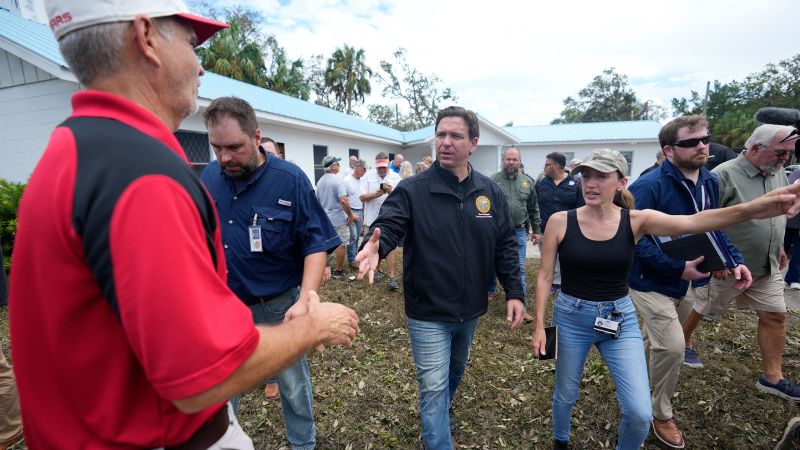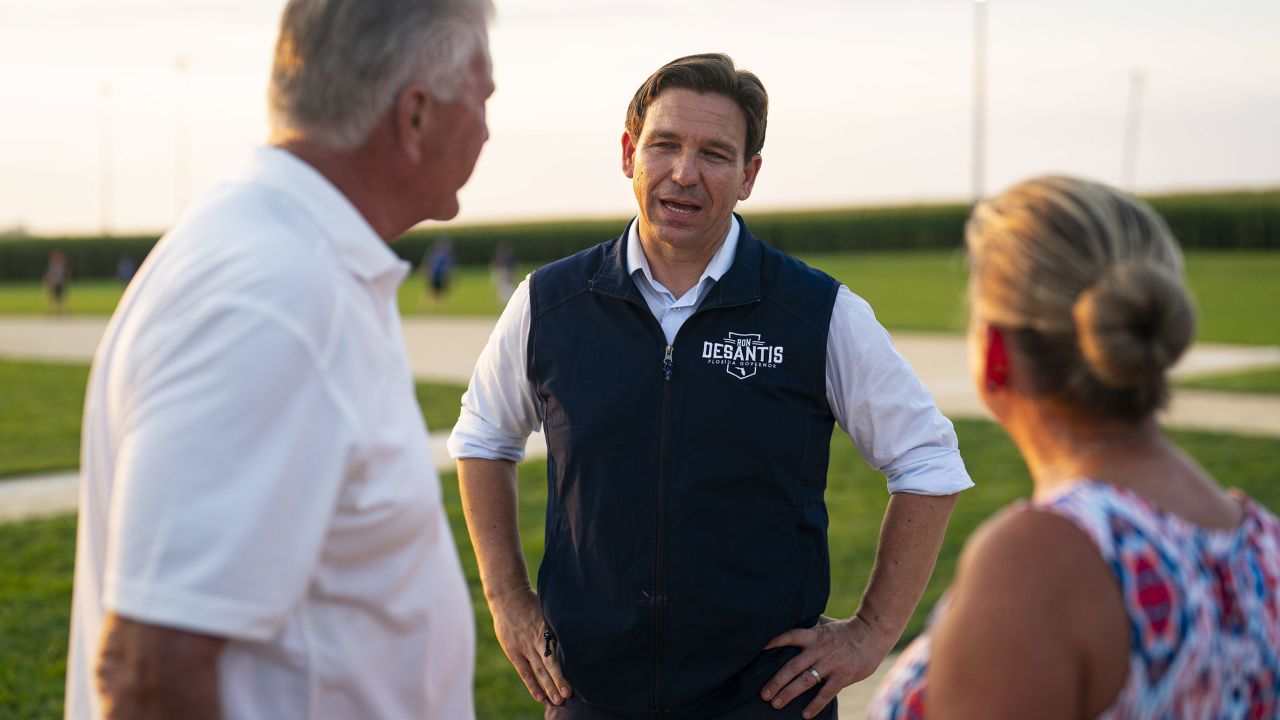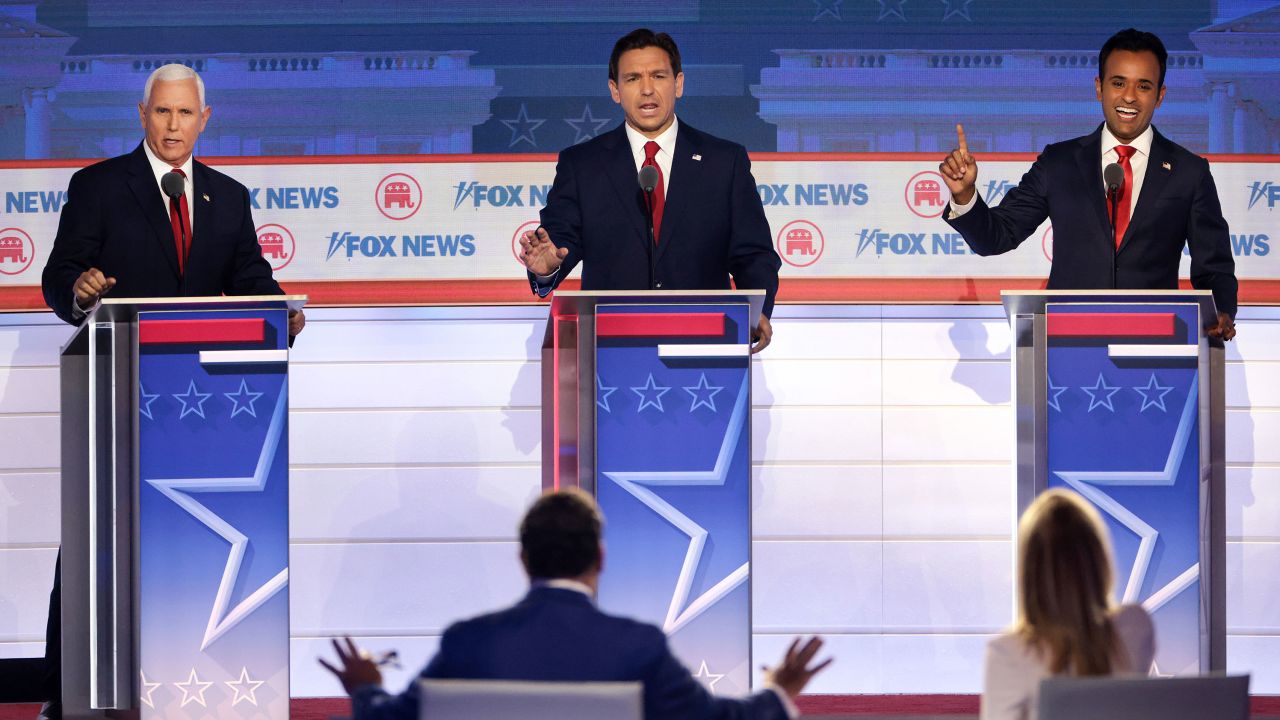
CNN
—
Ron DeSantis is expected to turn his focus once again to his White House bid this week and kickstart a post-Labor Day push for the 2024 Republican nomination that will intensify throughout the fall.
The Florida governor will ramp up his political activity within the coming days, a source told CNN after leaving the campaign trail to manage his state through Hurricane Idalia. DeSantis exits that leadership test unscathed, with more executive experience to showcase to Republican primary voters in the early-nominating states.
At the heart of that effort is Iowa, the state from where DeSantis left the campaign trail with Idalia barreling toward Florida’s Gulf Coast.
On that most recent Iowa trip, DeSantis was confronted by a paradox that has regularly challenged his presidential aspirations.
Inside a machine shop in northwest Iowa, a 21-year-old voter asked DeSantis to explain what separates him from GOP front-runner Donald Trump. Right after, an older gentleman warned DeSantis he risked losing support from Republicans if he didn’t stand by the former president amid his legal woes.
Standing in front of monstrous John Deere equipment in a mismatched navy suit, a blue dress shirt and black cowboy boots, DeSantis attempted to differentiate himself from Trump without criticizing him too harshly, a needle he has labored to thread for months. He told the 21-year-old, “I’m more likely to follow through on doing what I said I would do” while assuring the other man he is going to “take care of the Justice Department and FBI.”
DeSantis has elsewhere signaled he would prefer to stop talking about Trump, but the voters he now interacts with don’t always let him. It’s a byproduct of the campaign he is running, one where he is seemingly trying to win over Trump supporters and undecided Republicans one question at a time.
Ashley Ahrendt, a daycare director in Rock Rapids, wanted to know DeSantis’ plan for making child care more affordable. (“I don’t know that the federal government is gonna be able to solve that,” he told her). Grace Nasers, a recent high school graduate from Sibley, told DeSantis’ wife, Casey, she’s concerned schools aren’t teaching sex education in the wake of the recent education cultural wars. (“It doesn’t need to be a taboo subject,” Nasers said while Florida’s first couple toured her mother’s boutique.) Mike Mark, an Estherville corn farmer, probed DeSantis on ethanol, a key issue in the state. (“He doesn’t have a policy,” Mark concluded.)
Some, like Ahrendt, DeSantis has convinced. “I like a guy that delivers,” she told CNN. Nasers and her mother are unsure. Mark remains behind Trump.
A bank basement, a community college classroom, a boutique consignment shop – these are the places where DeSantis is fighting to overcome his campaign’s uneven start and build momentum heading into the fall. On a recent Friday in the Hawkeye State, DeSantis stopped in six northwest Iowa cities. Their combined population could fit comfortably inside a major league ballpark, with plenty of seating to spare. These deeply red farm communities heavily backed Trump in 2020, but people show up in dozens eager to hear what DeSantis has to sell.
“If Trump was the candidate, I would definitely vote for him. I’m just not sure what his future is,” said Donna Knoblock, a small-business owner who watched DeSantis speak in Rock Rapids, a city of 2,600 people near where Iowa, South Dakota and Minnesota converge. Her husband, a farmer, remains behind Trump, but she is open to alternatives.
At the same event, Steve Herman, a Lyon County supervisor, said he feels forced to consider someone other than the candidate he proudly voted for in 2020.
“If we all voted for Trump, he may be in prison,” Herman said. “And the Democrats will win again.”

This is not the campaign DeSantis set out to run when he launched his White House bid three months ago, but it is the one he finds himself in five months before Iowans head to their caucuses. After attempting to position himself as a front-runner, DeSantis has cut staff, changed campaign managers and is now waging an insurgent path that will require him to grind his way through early nominating states, particularly Iowa.
He is reintroducing himself to voters who know him best as the governor who charted a different path during the pandemic or as the cultural warrior who took on Disney. He spends more time talking about his family, his middle-class upbringing and military background than he did in his first weeks as a presidential candidate.
To the chagrin of some advisers, he still fixates on an alphabet soup of somewhat esoteric conservative targets – DEI (diversity, equity and inclusion) programs, ESG (environment, social and governance) investing, CRT (critical race theory) in schools, CBDC (central bank digital currency). But he also has lately emphasized more kitchen table Republican talking points such as border security, crime and economic pressures facing families. He says the word “woke” far less and asks people “What’s your name?” much more.
“This is our choice to put our best foot forward,” he told a packed room in Rock Rapids. “The issues in the election that should be front and center should be the issues you care about that affect you, your family and our country’s future. If we’re discussing anything else other than that, then we’re just playing into the Democrats’ hands.”
Most notably, he is making himself seen. A day after the first Republican presidential primary debate last month, DeSantis flew into Iowa for his fifth swing through the state in seven weeks. On the trip, DeSantis checked off his 53rd Iowa county. He has promised to hit all 99 before the caucuses on January 15.
It’s a strategy built on local support, organizing and personal connections with the candidate – the fundamentals that have won the state’s caucuses for past Republican contenders such as Mike Huckabee, Rick Santorum and Ted Cruz. DeSantis counts endorsements from 40 state legislators and at least one campaign chair in every county. More than 11,000 Iowans have committed to caucus for him, the campaign says, and a supportive super PAC, Never Back Down, claims it has knocked on 300,000 doors in the state – metrics that are impressive, albeit impossible to verify. Nevertheless, no other campaign is even suggesting it has a comparable field operation in the state. The goal is to get 108,617 Iowans to caucus for DeSantis in January.
The push is also backed by a steady stream of television ads. Never Back Down has aired $5.5 million in ads in Iowa through August, more than any other presidential super PAC or candidate, and it has reserved $11.4 million of airtime across six Iowa media markets for the fall. Ads will start airing Wednesday and will run through Halloween.
“By the time Iowans are sitting down for Thanksgiving dinner, there won’t be a caucusgoer who can’t say they didn’t have a chance to personally shake hands and ask a question of Ron DeSantis,” DeSantis deputy campaign manager David Polyansky told CNN in an interview.
The expectation is that many Republicans are only just tuning into the race, with the first GOP presidential primary debate serving as the unofficial kickoff to the fall campaign season. The debate in Milwaukee last month drew about 12.8 million viewers to Fox News.
DeSantis’ very online surrogates and supporters spent the 72 hours after the debate aggressively asserting that their candidate was the night’s winner. His campaign posted a lengthy thread on social media with “mounting evidence” of his victory and texted supporters a video of Fox hosts chatting up his performance.
About 20 donors and fundraisers stayed in Milwaukee the day after the debate dialing up support for the Florida governor, said Pete Snyder, a former candidate for Virginia governor now fundraising for DeSantis. The campaign announced it had raised $1 million in donations within 24 hours of the debate.
“We had a massive day, and it was because people were finally interested again,” Snyder said. “Things hit a lull in summer, and now people are waking up again. He stayed above the fray and got his message out in an unadulterated way. The donor class is fired up.”
One fundraiser, who asked not to be named, described the mood in DeSantis’ inner circle after the debate as “euphoria” – a sentiment not shared by the fundraiser and others close to the campaign, the fundraiser said. The concern is DeSantis may not have done enough to convince the rest of the field that it’s a two-person race between him and Trump, making it harder for him to consolidate support before the Iowa caucuses.
“I haven’t seen anything to suggest that any of these other people are going to fold up before then,” the fundraiser said.
Inside DeSantis’ post-debate Iowa swing, many people said they saw, at most, a handful of clips from the debate. Ethan Masters, the 21-year-old who pressed DeSantis at the machine shop on his differences with Trump, admitted he didn’t watch the debate – it wouldn’t be as entertaining without Trump, he said – but he walked away impressed by his in-person interaction with the governor.
“I’m not afraid that he’s gonna go on Twitter and say something that I might not like,” Masters said. “I think he’s going to be dealing with people a lot better than Trump.”

Surveys from before the debate showed Trump leading the field in Iowa with DeSantis in second, firmly ahead of the pack but well behind the former president. Hours before DeSantis stepped on the Milwaukee debate state, Jeff Roe, the chief strategist for Never Back Down, acknowledged to donors at a nearby meeting that DeSantis’ support in Iowa had slipped some, according to audio obtained by CNN, but he insisted it had recovered and compared the turnaround to John McCain’s path to winning the GOP nomination in 2008.
“We reversed trajectory,” Roe said. “First time that’s happened since McCain. McCain bottomed out, and then came back. Now we’re on number two.”
The DeSantis campaign also believes Trump has left an opening in Iowa through a series of unforced errors. He has barely touched down in the state and turned on Iowa’s popular Republican governor, Kim Reynolds, for welcoming other candidates to her state, especially DeSantis.
Still, Trump continues to demonstrate why he remains the front-runner. At last month’s Iowa State Fair, while DeSantis spent the day talking to voters and playing games with his young family, Trump swooped in for a brief show-stopping visit that drew a large crowd of onlookers. Both camps suggested their approaches won the day.
Trump’s mounting legal troubles have also generated $30 million of daily unearned media, a Never Back Down official said at the Milwaukee donor meeting, peaking at $100 million on days he is indicted. DeSantis generated about one-fifth of that.
A source at the super PAC said DeSantis has outpaced Trump in earned media over the past week amid constant coverage of Hurricane Idalia. DeSantis’ management of the storm’s approach toward Florida has earned him praise from political rivals – including President Joe Biden and former Arkansas Gov. Asa Hutchinson, also a GOP presidential contender – and silence from Trump. Meanwhile, he has appeared regularly on television handling the crisis, with particular glowing reviews of his performance from Rupert Murdoch’s media empire.
“The lawfare of Donald Trump is controlling the Republican process in this primary,” said Steve Deace, an influential conservative radio host with deep ties to Iowa and a DeSantis backer. “None of us know what’s going to happen. So right now you want to control what you can control, and what you can control is building a 99-county organization on the ground in Iowa.”
It is one thing to emerge out of Iowa as the victor, but carrying that momentum to other states has vexed past caucus winners. There has never been a President Cruz, Santorum or Huckabee, an illustration of the pitfalls of an Iowa-or-bust strategy. Polyansky, a veteran of two of those campaigns who recently moved from the supportive super PAC to help stabilize the DeSantis official operation, acknowledged those efforts were “incredibly heavy towards Iowa at the expense of investing time elsewhere.” DeSantis, he insisted, “is attractive in each of the early states and is willing to travel and work hard in all of them.”
Polyansky also pointed to the work of Never Back Down, which has made unprecedented investments for a super PAC to build out a field operation and has assumed many duties typically undertaken by a campaign. The super PAC, Polyansky said, has “built tremendous political operations not just in Iowa and New Hampshire but South Carolina and Nevada too. And they’re giving those programs valuable ‘air-cover’ by investing heavily on television with a massive buy in Iowa but also driving messaging in New Hampshire.”
Since that conversation, though, Never Back Down pulled its door-knockers out of Nevada, the super PAC confirmed. NBC News first reported the news last week.
